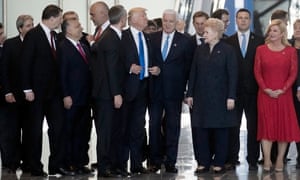He crunched hands, shoved shoulders and struck poses. He scoffed chocolates, ignored protocol and harangued heads of state. He denied saying things he had said, then said things that showed he did not understand.
It may, mercifully, have passed off without apocalyptic mishap, but Donald Trump’s first transatlantic trip as US president still left European leaders shaken.
First, there were the body language battles. Trump is well known for his efforts to dominate male interlocutors with a firm handshake, often accompanied by an arm wrench: notable victims include the Japanese prime minister Shinzo Abe, who survived a 19-second power grip in February.
In Brussels on Thursday for meetings with EU and Nato leaders, he was trumped by the French president, Emmanuel Macron, whose smile and squeeze – reporters present described “knuckles whitening” and “faces tightening” – were so fierce that Trump was forced to yield.
Merkel, Nato secretary general Jens Stoltenberg and several others responded with open, if disbelieving, laughter. The Europeans appeared even more startled when Trump shoved aside the prime minister of Montenegro, Dusko Markovic, to get to the front of the family photo.
The US president barrelled his way through the group before drawing himself up to his full height, snapping his jacket together and striking a truculent pose – prompting the writer JK Rowling to caption a tweeted GIF of the incident with the words, “You tiny, tiny, tiny little man.”
He linked terrorism and immigration in a way very few of his fellow leaders would do, and failed to dispel persistent doubts about US commitment to Nato by endorsing Article 5, the mutual defence pledge at the heart of the alliance.
While arguably undiplomatic, this was at least familiar from Trump’s campaign rhetoric and thus, to some extent, expected. What European leaders did not seem to have anticipated was the US president’s patchy understanding of the bloc.
The Belgian daily Le Soir reported that while eating “a lot” of “the best” chocolates, Trump revealed to prime minister Charles Michel that his frequent criticisms of the EU were due largely to his personal experiences trying to set up businesses there.
“Every time we talked about a country, he remembered the things he had done,” one source told the paper. “Scotland? He said he had opened a club. Ireland? He said it took him two-and-a-half years to get a licence and that did not give him a very good image of the EU.”
Besides reportedly telling EU leaders the Germans were “bad, very bad” on trade, Trump and his team shocked the Europeans by their ignorance of the bloc’s trade policy, according to Süddeutsche Zeitung, repeatedly suggesting America had different trade deals with Germany and Belgium.
And the US president appeared at least once to deny his own words. A French official told AP that having publicly described the far right’s Marine Le Pen as “the strongest” candidate in France’s presidential election, he told Macron on Thursday “you were my guy” in the vote.

No comments:
Post a Comment